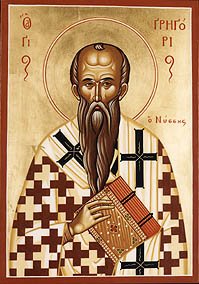"To follow God wherever He may lead is to behold God."

Today in the Byzantine Church is the feast of St. Gregory of Nyssa. I owe a lot to this saint. In truth, he is the one that broke me out of my closed-minded, integrist polemical obessions in order to find the real meaning of Christianity, which is, for him, the imitation of God.
Although much of what he writes can be easily attributed to the Platonism popular at the time, he is still very much a Christian. For St. Gregory, sin means a failure to change for the better. For him, life in general is not static. He is thus best known for his doctrine of "epekstasis": the forgetting of the things that are behind, and the stretching out towards the things that are before.
Even as a great defender of the Orthodox Faith (which is emphasized in the Byzantine service for him), he realized that precise definition is not the end all and be all of what we believe. In his commentary on the Song of Songs, he writes that while the Prophets, Apostles, and their doctrines could be compared to dew, the Word Himself is a river, or rather an infinite ocean in comparison. This is something that must be remembered in our polemical age.
But most of all, what has drawn me so much to his writings is his emphasis on the role of beauty, or rather of the Uncreated Beauty, in the our Christian life. Thus, for me, he is the patron of this blog, my leading light in the search for an aesthetic Christianity. For him, all the beauty of the material world is real and marvellous, but fleeting and perishing compared to the beauty that is within, the beauty that is the life in Christ. "Why marvel at the stars," he says in one place, "when you are eternal? They were not made in the image and likeness of God. You were." This is the real dignity of the Christian, one that goes beyond what liberal Christians think. Man is the key to the universe, the ultimate summit of the beauty of the cosmos.
But for St. Gregory, this search for Uncreated Beauty is never ending, and thus never fufilled. He writes in his life of Moses:
"[Moses] still thirsts for that with which he is constantly filled to capacity, and he asks to attain as if he had never partaken, beseeching God to appear to him, not according to his capacity to partake, but according to God's true being.
Such an experience seems to me to belong to the soul which loves the beautiful. Hope always draws the soul from the beauty which is seen to what is beyond, always kindles the desire for the hidden through what is constantly perceived. Therefore, the ardent lover of beauty, although receiving what is always visible as an image of what he desires, yet longs to be filled with the very stamp of the archetype.
And the bold request which goes up to the mountains of desire asks this: to enjoy the Beauty not in mirrors and reflections, but face to face. The divine voice granted what was requested in what was denied, showing in a few words an immeasurable depth of thought. The munificence of God assented to the fufillment of the desire, but did not promise any cessation or satiety of the desire."
For us, this is our mission as well, as a Christian. As long as we stay faithful to God's commandments, and repent when we are not, we shall continue to go from glory to glory, ascending through the veils of this life (however splendid they may be) towards the Eternal Beauty Who created all things.
Saint Gregory of Nyssa, pray to God for us!



4 Comments:
Yes, yes, and yes to that.
Perhaps you have pondered that famous saying of St. Gregory of Nyssa:
"concepts create idols, only wonder knows."
Lots in there. I once read an excellent unpacking of this sentence, by Patriarch Bartholemew.
Where's that quote from, do you know? It is very St. Gregory.
Bottom line: we don't really know anything but awe, thanksgiving, and love. That's what's important, and if you don't have that, you are not a Christian.
That is really interesting. I would like to do a study on him now. Thanks for the information!
There is a good anthology of St Gregory of Nyssa's writings put out by St. Vladimir Seminary press called "From Glory to Glory", that is also has a good introduction by Cardinal Danielou. It is easy reading and a good place to strart.
Post a Comment
<< Home